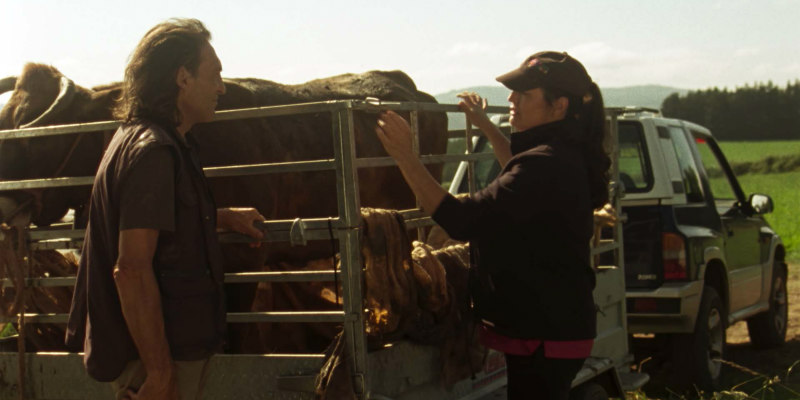Review by Benjamin Poole
Directed by: Oliver Laxe
Starring: Amador Arias Mon, Benedicta Sánchez, Inazio Brao, Nuria Sotelo, Rubén Gómez Coelho, Iván Yáñez, Luis Manuel Guerrero Sánchez


The latest film from French auteur Oliver Laxe, Fire Will Come, opens with beech trees falling in delicate slow-motion at nightfall. This goes on for some time. Trees falling. Swaying to the ground in the gracious manner of a ballerina swooning carefully upon a sylvan, moonlit stage. A tree falls, and then yet another tree. And you’re sitting there with your pen in your hand, reviewer’s cap on, wondering, "how is this so riveting?" What do Laxe and cinematographer Mauro Herce have, what occult command of imagery and motion, that makes this ostensibly straightforward sequence of timber logging so utterly captivating? Less like razing wood and more like a meditation on time, death and the terrifying impermanence of the natural world?


Perhaps Laxe is a magician, who manipulates the light and shade of the cinema screen with an instinct beyond the measure of mortal man. Following his superb Mimosas, this, his third feature, displays further evidence of this ace filmmaker’s potentially sorcerous skills.
[ READ MORE: New Release Review - Days of the Bagnold Summer ]
Co-written with Santiago Fillol, Fire Will Come focuses its narrative on Amador (played by Amador Arias), an old man who is an arsonist. Recently released from prison, Amador returns to the nearby village of Lugo where his elderly mother lives. The other people within this tight-knit Galacian community have long memories however, and most reject Amador for the fiery crimes he got sent down for. The approbation is of seemingly little consequence for Amador and his heart-breakingly dignified mother though, who humbly live out an essential, rural existence upon the outskirts of this already strange and liminal space.


Lugo is a city in north-western Spain, part of the autonomous community of Galicia: a territory that Laxe fully immerses us within. His films move at a pace that is almost glacial, lingering upon the specific everyday details of this harsh life, forging poetry from the elemental imagery; the deafening sizzle of a pan, the vertiginous aerial shot of Amador’s van upon a bridge as he returns home through the thickly wooded countryside, the docile defiance of a cow stuck within a stream.
[ READ MORE: New Release Review - The County ]
This last instance leads to Amador meeting Elena (played by Elena Mar Fernández - note the interchangeable appellations: artsy!), an attractive vet from the town. Will this human interchange provide redemption for Amador, or will the potential rejection tip him over the edge into old, twisted patterns? After all, due to lingering resentments, any attempt at honest employment has eluded Amador, and it is only a matter of time before Elena discovers the truth about this bit of rough farm hand…


No spoilers, as it is all up there in the title: yes, a fire does come. Watching the violently tangerine flames subsume the countryside, and swallow the screen, again your mind is set alight: how is Laxe doing this? Did he, you know, actually set a forest on fire? The disquieting chaos of the fire as it works its way across the various hamlets and houses that exist on the outskirts of the town just seems so vivid and appallingly real. The hopeless attempts of the townspeople to keep the flames at bay, the destruction wrought, the vacated houses…
Fire Will Come is not for the nervous (a scene involving a couple of abandoned goats still has me gnawing at my lips in molten anxiety). It is, however, as close to the sacred essence of cinema (as in an associative collocation of image and sounds which mimics the heavy skeins of dreams that tie us once again to our essential selves, like), as is feasible. A figurative Guy Fawkes doll, Amador is metaphorically tossed upon the flames, with Laxe allowing no easy answers to the origin of the pyre. Fire Will Come leaves scorch marks upon the screen.

Fire Will Come is on UK DVD May 25th.
"If Hitchcock made a career out of indulging our voyeuristic tendencies, he never excited them more skilfully, or with more gleeful self-awareness, than in Rear Window."@renzelen looks back at Alfred Hitchcock's REAR WINDOWhttps://t.co/ZM8BFBAgTN pic.twitter.com/Y92iHH5m2a— 𝕋𝕙𝕖 𝕄𝕠𝕧𝕚𝕖 𝕎𝕒𝕗𝕗𝕝𝕖𝕣 (@themoviewaffler) March 14, 2020


